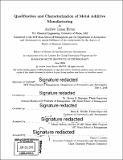Qualification and characterization of metal additive manufacturing
Author(s)
Byron, Andrew James
DownloadFull printable version (13.89Mb)
Other Contributors
Leaders for Global Operations Program.
Advisor
Steven D. Eppinger and Brian L. Wardle.
Terms of use
Metadata
Show full item recordAbstract
Additive manufacturing (AM) has emerged as an effective and efficient way to digitally manufacture complicated structures. Raytheon Missile Systems seeks to gain limited production capability with metals AM, which can only be achieved with qualified, predictable processes that reduce variation. The project documented in this thesis produced two results needed to qualify AM for use on flight-critical parts: i) creation of a standard qualification process building upon Raytheon's product development knowledge, and ii) selection and identification of key metals AM process factors and their corresponding experimental responses. The project has delivered a qualification test plan and process that will be used next year to drive adoption and integration of Raytheon's metals AM technology. The first phase of the designed experiment on AM process factors was completed by experimenting with coupon orientation, position on the build platform, coupon shape and hot isostatic pressing (HIP) post-treatment for an Al alloy (AlSi10Mg) produced via laser powder bed fusion using 400-watt laser equipment. Only coupon orientation had a statistically significant effect on dimensional accuracy, increasing the variance of y-axis (within the build plane) error by ~50%, although this is considered a small increase. HIP decreased yield and ultimate stresses by ~60% while increasing ultimate strain by ~250%. Vertical orientation of coupons decreased yield and ultimate stresses by ~25% and increased ultimate strain by ~30%. Small coupon area on the build platform, associated with thin rectangle coupons, decreased yield stress and ultimate strain by ~5%. The processes and case study from this thesis represent a general advance in the adoption of metals AM in aerospace manufacturing.
Description
Thesis: M.B.A., Massachusetts Institute of Technology, Sloan School of Management, 2016. In conjunction with the Leaders for Global Operations Program at MIT. Thesis: S.M. in Engineering Systems, Massachusetts Institute of Technology, Department of Aeronautics and Astronautics, 2016. In conjunction with the Leaders for Global Operations Program at MIT. Cataloged from PDF version of thesis. Includes bibliographical references (pages 119-123).
Date issued
2016Department
Leaders for Global Operations Program at MIT; Massachusetts Institute of Technology. Department of Aeronautics and Astronautics; Sloan School of ManagementPublisher
Massachusetts Institute of Technology
Keywords
Sloan School of Management., Aeronautics and Astronautics., Leaders for Global Operations Program.